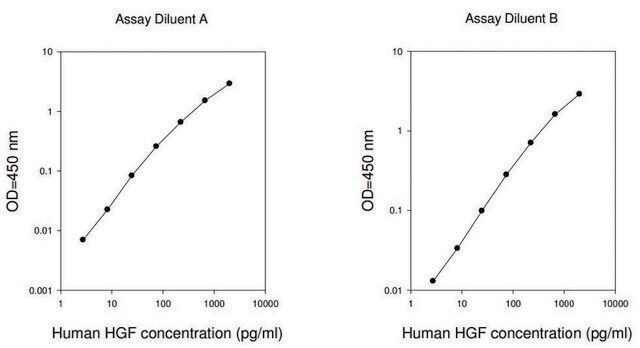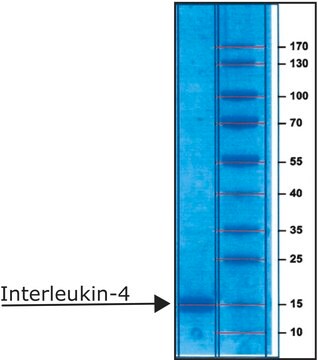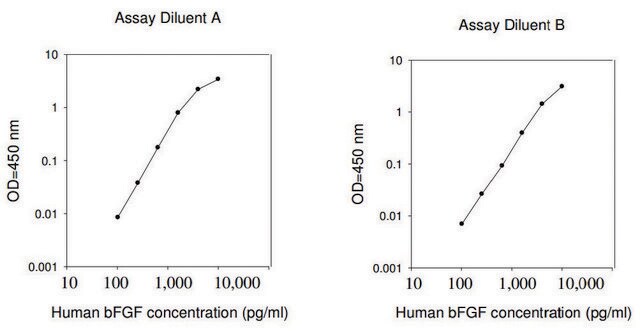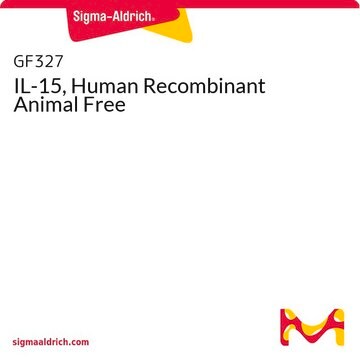RAB0329
Mouse SCF ELISA Kit
for serum, plasma and cell culture supernatant
Autenticatiper visualizzare i prezzi riservati alla tua organizzazione & contrattuali
About This Item
Codice UNSPSC:
41116158
NACRES:
NA.32
Prodotti consigliati
Reattività contro le specie
mouse
Confezionamento
kit of 96 wells (12 strips x 8 wells)
tecniche
ELISA: suitable
capture ELISA: suitable
input
sample type serum
sample type plasma
sample type cell culture supernatant(s)
assay range
inter-assay cv: <12%
intra-assay cv: <10%
sensitivity: 5 pg/mL
standard curve range: 2.74-2000 pg/mL
Metodo di rivelazione
colorimetric
Condizioni di spedizione
wet ice
Temperatura di conservazione
−20°C
Informazioni sul gene
mouse ... Kitl(17311)
Descrizione generale
The Mouse SCF ELISA (Enzyme-Linked Immunosorbent Assay) kit is an in vitro enzyme-linked immunosorbent assay for the quantitative measurement of mouse SCF in serum, plasma, cell culture supernatants and urine.
Immunogeno
Recombinant Mouse SCF
Applicazioni
For research use only. Not for use in diagnostic procedures.
Please refer to the attached General ELISA KIT Procedure (sandwich, competitive & Indirect ELISA)
Please refer to the attached General ELISA KIT Procedure (sandwich, competitive & Indirect ELISA)
Azioni biochim/fisiol
Stem cell Factor (SCF) or kit ligand or steel factor or mast cell growth factor is a growth factor essential to bring about various homeostatic events like maintenance of hematopoietic stem cells, mast cells and melanocytes. SCF is essential for maintaining mature melanocytes and to promote hair pigmentation. In ovary, granulosa cells produce kit ligand, which promotes activation and growth of primordial follicles. Kit ligand converts primordial follicles to primary follicles and leads to subsequent follicle growth. Kit ligand acts as an anti-apoptotic factor and causes the growth of primordial follicles in mouse fetal ovary. Kit signalling is crucial for growth of interstitial cells of Cajal (ICCs) and regulates gastrointestinal motility in fetal mice.
Altre note
A sample Certificate of Analysis is available for this product.
Please type the word sample in the text box provided for lot number.
Please type the word sample in the text box provided for lot number.
I componenti del kit sono disponibili anche separatamente
N° Catalogo
Descrizione
SDS
Avvertenze
Warning
Indicazioni di pericolo
Consigli di prudenza
Classi di pericolo
Met. Corr. 1
Codice della classe di stoccaggio
8A - Combustible corrosive hazardous materials
Scegli una delle versioni più recenti:
Possiedi già questo prodotto?
I documenti relativi ai prodotti acquistati recentemente sono disponibili nell’Archivio dei documenti.
Identification of hair shaft progenitors that create a niche for hair pigmentation
Liao CP, et al.
Genes & Development, 31, 1-13 (2017)
Stem cell factor/Kit signal insufficiency contributes to hypoxia-induced intestinal motility dysfunctions in neonatal mice
Ren H, et al.
Digestive Diseases and Sciences, 62(5), 1193-1203 (2017)
Charlotte B Westbury et al.
Radiotherapy and oncology : journal of the European Society for Therapeutic Radiology and Oncology, 111(2), 206-211 (2014-04-22)
Mast cells are involved in the pathogenesis of radiation fibrosis and may be a therapeutic target. The mechanism of increased mast cell number in relation to acute and late tissue responses in human skin was investigated. Punch biopsies of skin
Kit ligand decreases the incidence of apoptosis in cultured vitrified whole mouse ovaries.
Abdi S
Reproductive Biomedicine Online, 30(5), 493-503 (2015)
Armelle Calipel et al.
Clinical & experimental metastasis, 31(5), 553-564 (2014-03-22)
Imatinib mesylate is used in targeted therapy of cancer to inhibit type III tyrosine kinase receptors, such as KIT and platelet-derived growth factor receptors (PDGFRs). Expression of KIT in uveal melanoma (UM) suggests that this receptor may be the target
Il team dei nostri ricercatori vanta grande esperienza in tutte le aree della ricerca quali Life Science, scienza dei materiali, sintesi chimica, cromatografia, discipline analitiche, ecc..
Contatta l'Assistenza Tecnica.









